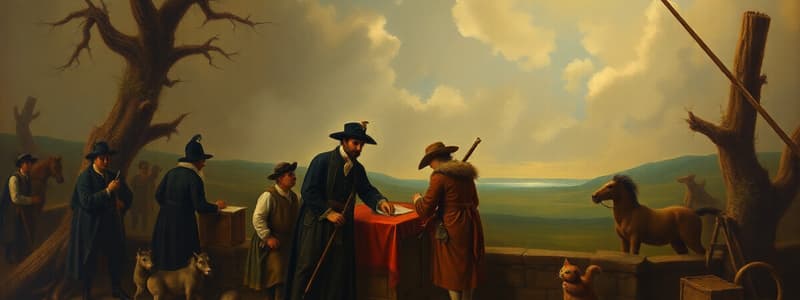Podcast
Questions and Answers
ما هي أهمية العبارة "الضرائب بدون تمثيل"؟
ما هي أهمية العبارة "الضرائب بدون تمثيل"؟
- تعتبر دعوة للشمولية السياسية.
- ترمز إلى أهمية رفع الضرائب.
- تتعلق بحماية حقوق الملكية.
- تشير إلى ضرورة تمثيل الشعب في الحكومة. (correct)
لماذا فشلت مواد الاتحاد؟
لماذا فشلت مواد الاتحاد؟
- لعدم اهتمام المواطنين بها.
- لأنها كانت تحمي حقوق الولايات بشكل مفرط.
- لقلة السلطات الممنوحة للحكومة الاتحادية. (correct)
- لعدم وجود ائتلاف سياسي.
كيف غيرت عقيدة المصير الواضح الولايات المتحدة إلى الأبد؟
كيف غيرت عقيدة المصير الواضح الولايات المتحدة إلى الأبد؟
- بفتح الأراضي للاستعمار. (correct)
- من خلال تعزيز الفيدرالية.
- بإلغاء العبودية.
- عن طريق تعزيز حقوق المرأة.
ما هي بعض عوامل 'الجذب' للمهاجرين خلال أواخر القرن التاسع عشر؟
ما هي بعض عوامل 'الجذب' للمهاجرين خلال أواخر القرن التاسع عشر؟
ما هما العاملان اللذان أديا إلى دخول الولايات المتحدة في الحرب العالمية الأولى؟
ما هما العاملان اللذان أديا إلى دخول الولايات المتحدة في الحرب العالمية الأولى؟
كيف ساهمت وسائل الإعلام الجماهيري في تشكيل الثقافة الشعبية الأمريكية خلال عشرينيات القرن العشرين؟
كيف ساهمت وسائل الإعلام الجماهيري في تشكيل الثقافة الشعبية الأمريكية خلال عشرينيات القرن العشرين؟
ما هي بعض من الأسباب الرئيسية للكساد العظيم؟
ما هي بعض من الأسباب الرئيسية للكساد العظيم؟
Flashcards
الضريبة دون تمثيل
الضريبة دون تمثيل
إنها عبارة تقول إن الناس يجب ألا يُفرض عليهم الضرائب من دون أن يكون لهم تمثيل في الحكومة. كان هذا أحد الأسباب الرئيسية لثورة أمريكا.
أعمال لا تطاق
أعمال لا تطاق
كانت مجموعة من القوانين التي اعتمدتها بريطانيا على المستعمرات الأمريكية. أدت هذه القوانين إلى إثارة غضب المستعمرين لأنها اعتُبرت غير عادلة.
مُقترحات الكونفدرالية
مُقترحات الكونفدرالية
كانت أول دستور للولايات المتحدة. وُضع عام 1781 بعد ثورة الاستقلال. لم يكن ناجحًا في التغلب على تحديات الولايات المتحدة.
المصير المُقدّر
المصير المُقدّر
Signup and view all the flashcards
حق التصويت
حق التصويت
Signup and view all the flashcards
الحرب الأهلية الأمريكية
الحرب الأهلية الأمريكية
Signup and view all the flashcards
قوانين سوداء
قوانين سوداء
Signup and view all the flashcards
قضية بليسي ضد فيرجسون
قضية بليسي ضد فيرجسون
Signup and view all the flashcards
Study Notes
Lesson 5: Taxation Without Representation
- "Taxation without Representation" emphasized the colonists' grievance against British taxes imposed without their consent. They believed this violated their fundamental rights.
Lesson 6: Failures of the Articles of Confederation
- The Articles of Confederation, the first governing document of the newly formed United States, proved ineffective. Its weak central government couldn't enforce laws, regulate trade, or effectively address internal conflicts. The central government lacked taxing power.
Lesson 8: Manifest Destiny
- Manifest Destiny, the belief that the US was destined to expand across the continent, had profound, lasting consequences. It led to westward expansion, displacement of Native American populations, and conflict with Mexico.
- It did not benefit all those involved. Native American tribes were forced off their ancestral lands, and many were subjected to brutal treatment and loss of culture.
Lesson 9: Slavery and the Civil War
- The division over slavery in the mid-1800s escalated tensions between the North and South. Differences in economic systems, social views, and political ideologies, driven by the morality and profitability of slavery, ultimately led to the outbreak of the Civil War.
Lesson 15: Immigration (Pull and Push Factors)
- Pull Factors for immigrants during the late 1800s included economic opportunities, religious freedom, and political stability.
- Push Factors included poverty, famine, political persecution, and war.
Lesson 22: US Entry into World War I
- Two key factors led the US into World War I: German unrestricted submarine warfare and the Zimmermann Note (which proposed a German-Mexican alliance against the US).
Lesson 1920s: Consumer Culture
- The 1920s saw the rise of consumer culture. This was fueled by increased production, mass advertising, and the availability of credit.
Lesson 1920s: Mass Media's Role
- Mass media (radio, film) played a significant role in shaping American popular culture during the 1920s, spreading new ideas, trends, and values across the country.
Lesson: Causes of the Great Depression
- Several factors contributed to the Great Depression, including: Overproduction, stock market speculation, and bank failures.
Lesson: Coping with the Great Depression
- During the Great Depression, Americans sought various forms of distraction and relief from suffering, including popular entertainment, political activism, and efforts at shared survival.
Vocabulary Definitions (TCI):
- Declaration of Independence: A document declaring the thirteen American colonies independent of Great Britain.
- Intolerable Acts: Punitive laws passed by British Parliament after the Boston Tea Party.
- Articles of Confederation: The first constitution establishing a "league of friendship" between thirteen original states.
- Checks and Balances: A system in the US government requiring each branch to limit the power of the others.
- Constitution of the United States: A written document outlining the fundamental principles and laws of the US government.
- Great Compromise: A compromise between a large-state and a small-state plan, leading to a bicameral Congress.
- Separation of Powers: Dividing governmental power among three branches.
- Abolition: The movement to end slavery.
- Indian Removal Act: Forcibly removing Native American tribes from their lands.
- Manifest Destiny: A belief that the US was destined to expand its territory and influence across the continent.
- Suffrage: The right to vote.
- Compromise of 1850: A series of agreements intended to resolve the issue of slavery's expansion.
- Dred Scott Decision: A Supreme Court ruling that denied citizenship to enslaved people.
- Missouri Compromise: Agreement temporarily resolving the slavery issue in newly acquired territories.
- Anaconda Plan: A Union strategy to crush the Confederacy.
- Emancipation Proclamation: Issued by President Lincoln, freeing enslaved people in the Confederate States.
- Black Codes: Laws passed in the post-Civil War South to restrict the rights of African Americans.
- 13th Amendment: Abolished slavery in the United States.
- 14th Amendment: Granted citizenship rights to all persons born or naturalized in the US.
- 15th Amendment: Prohibited the denial of voting rights based on race, color, or previous condition of servitude.
- Grandfather Clause: A law that allowed individuals to vote if their ancestors had voted prior to 1866.
- Jim Crow Law: State and local laws enforcing racial segregation in the Southern US.
- Plessy v. Ferguson: A Supreme Court decision establishing the "separate but equal" doctrine.
- Assimilation: The process of adopting the dominant culture.
- Dawes Act: Designed to break up Native American reservations.
- Homestead Act: Promoted westward expansion by offering land to settlers
- Lobbyist: Someone who advocates for a specific interest group.
- Reservation: A designated area for Native American tribes.
- Transcontinental Railroad: A railroad system connecting the east and west coasts of the United States.
- Capitalism: An economic system based on private ownership and free markets.
- Monopoly: Exclusive control of a commodity or service in a particular market.
- Sherman Antitrust Act: Legislation intended to combat monopolies and promote fair competition.
- Social Darwinism: Applying Darwin's theory of natural selection to society (often used to justify inequality).
- Trust: A group of companies combined under similar ownership or management.
- Angel Island: An immigration station in San Francisco, CA, for Asian immigrants.
- Ellis Island: An immigration station in New York Harbor, for European immigrants.
- Immigration Station: A port of entry to a country.
- Nativism: Favoring native-born citizens over immigrants.
- Push Factor: Factors driving people away from a location.
- Pull Factor: Factors attracting people to a location.
- Muckraker: Journalists who exposed societal problems.
- The Jungle: Novel exposing unsanitary conditions in the meatpacking industry.
- Imperialism: A policy of extending a country's power and influence.
- Monroe Doctrine: A US policy opposing European colonialism in the Americas.
- Neutrality: A policy of not taking sides in a conflict.
- USS Maine: A US warship that exploded in Havana Harbor
- Big Stick Diplomacy: A US policy using military strength to achieve goals.
- Dollar Diplomacy: A US policy using economic power.
- Moral Diplomacy: A US policy promoting democratic ideals.
- Lusitania: A British ship sunk by a German submarine.
- Militarism: A policy of maintaining a strong military.
- Nationalism: Intense patriotism.
- Propaganda: Information used to promote or damage a cause.
- Zimmermann Note: A diplomatic telegram proposing a German-Mexican alliance.
- Selective Service Act: Authorized the drafting of men into military service.
- Demobilization: Ending a military campaign and bringing soldiers home.
- Sacco and Vanzetti Trial: A controversial trial of two Italian immigrants accused of murder.
- Consumer Culture: An emphasis on purchasing goods and services.
- Popular Culture: Cultural trends and values shared widely.
- Roaring Twenties: A period of economic prosperity, cultural change, and social change.
- Black Tuesday: The day the stock market crashed
- Stock Market Crash: The collapse of stock prices in a short period of time.
- Hooverville: Shantytowns built by homeless people during the Great Depression.
- Trickle-Down Theory: The belief that economic benefits for the wealthy will eventually lower-income people.
- Dust Bowl: A period of severe drought and dust storms in the 1930s.
Studying That Suits You
Use AI to generate personalized quizzes and flashcards to suit your learning preferences.




